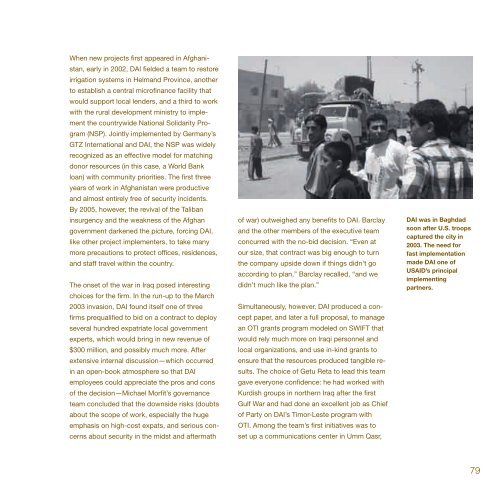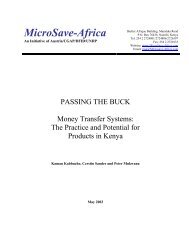Create successful ePaper yourself
Turn your PDF publications into a flip-book with our unique Google optimized e-Paper software.
When new projects first appeared in Afghanistan,<br />
early in 2002, <strong>DAI</strong> fielded a team to restore<br />
irrigation systems in Helmand Province, another<br />
to establish a central micr<strong>of</strong>inance facility that<br />
would support local lenders, and a third to work<br />
with the rural development ministry to implement<br />
the countrywide National Solidarity Program<br />
(NSP). Jointly implemented by Germany’s<br />
GTZ International and <strong>DAI</strong>, the NSP was widely<br />
recognized as an effective model for matching<br />
donor resources (in this case, a World Bank<br />
loan) with community priorities. The first three<br />
<strong>years</strong> <strong>of</strong> work in Afghanistan were productive<br />
and almost entirely free <strong>of</strong> security incidents.<br />
By 2005, however, the revival <strong>of</strong> the Taliban<br />
insurgency and the weakness <strong>of</strong> the Afghan<br />
government darkened the picture, forcing <strong>DAI</strong>,<br />
like other project implementers, to take many<br />
more precautions to protect <strong>of</strong>fices, residences,<br />
and staff travel within the country.<br />
The onset <strong>of</strong> the war in Iraq posed interesting<br />
choices for the firm. In the run-up to the March<br />
2003 invasion, <strong>DAI</strong> found itself one <strong>of</strong> three<br />
firms prequalified to bid on a contract to deploy<br />
several hundred expatriate local government<br />
experts, which would bring in new revenue <strong>of</strong><br />
$300 million, and possibly much more. After<br />
extensive internal discussion—which occurred<br />
in an open-book atmosphere so that <strong>DAI</strong><br />
employees could appreciate the pros and cons<br />
<strong>of</strong> the decision—Michael Morfit’s governance<br />
team concluded that the downside risks (doubts<br />
about the scope <strong>of</strong> work, especially the huge<br />
emphasis on high-cost expats, and serious concerns<br />
about security in the midst and aftermath<br />
<strong>of</strong> war) outweighed any benefits to <strong>DAI</strong>. Barclay<br />
and the other members <strong>of</strong> the executive team<br />
concurred with the no-bid decision. “Even at<br />
our size, that contract was big enough to turn<br />
the company upside down if things didn’t go<br />
according to plan,” Barclay recalled, “and we<br />
didn’t much like the plan.”<br />
Simultaneously, however, <strong>DAI</strong> produced a concept<br />
paper, and later a full proposal, to manage<br />
an OTI grants program modeled on SWIFT that<br />
would rely much more on Iraqi personnel and<br />
local organizations, and use in-kind grants to<br />
ensure that the resources produced tangible results.<br />
The choice <strong>of</strong> Getu Reta to lead this team<br />
gave everyone confidence: he had worked with<br />
Kurdish groups in northern Iraq after the first<br />
Gulf War and had done an excellent job as Chief<br />
<strong>of</strong> Party on <strong>DAI</strong>’s Timor-Leste program with<br />
OTI. Among the team’s first initiatives was to<br />
set up a communications center in Umm Qasr,<br />
<strong>DAI</strong> was in Baghdad<br />
soon after U.S. troops<br />
captured the city in<br />
2003. The need for<br />
fast implementation<br />
made <strong>DAI</strong> one <strong>of</strong><br />
USAID’s principal<br />
implementing<br />
partners.<br />
79



